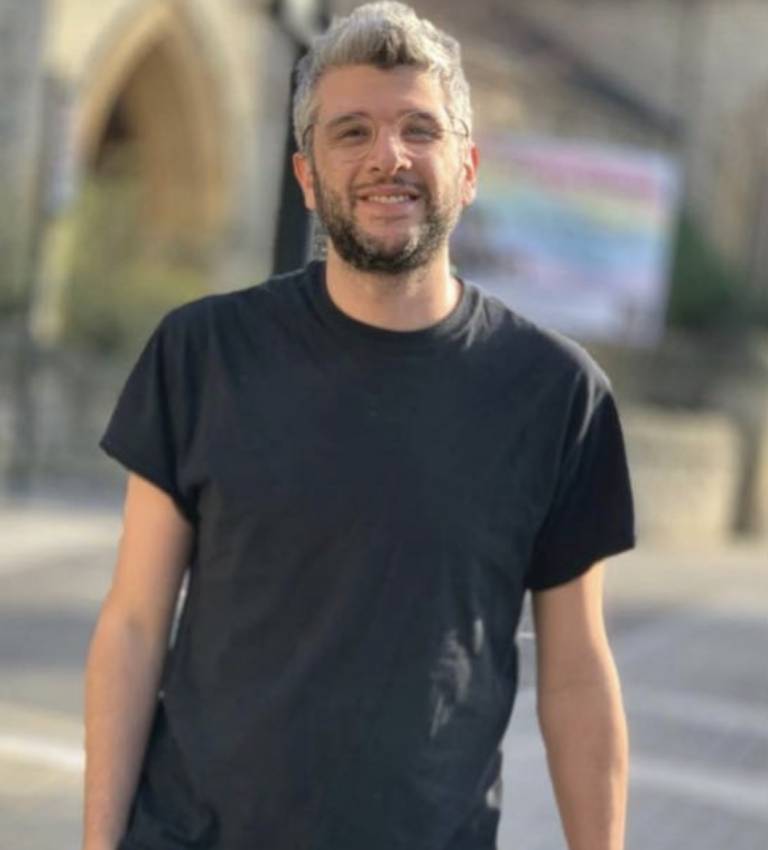The UCL IHI Student Experience: #1 Costas Parisinos
30 August 2019
The UCL Institute of Health Informatics offers a range of postgraduate study programmes and students benefit from being at the centre of a unique hub of biomedical and informatics research expertise. Here, one of our current students shares their thoughts on life at the UCL IHI.

Costas Parisinos is currently a PhD student at the UCL Institute of Health Informatics and is a Wellcome Trust Clinical Research Training Fellow and Specialist Registrar. Costas studied Medicine at the University of Edinburgh followed by a Masters in Public Health at the London School of Hygeine and Tropical Medicine. Before embarking on his PhD in 2016, Costas worked as a clinician in various NHS hospitals for seven years. We asked Costas some questions about what it is like to study at the UCL IHI:
What projects are you currently working on?
I am using electronic health records, imaging and genetics to investigate the causes of chronic liver disease and to explore its relationship with other conditions such as cardiovascular diseases, non-liver malignancies and diabetes.
What excited you about the project?
Chronic liver disease and associated conditions such as liver cancer are on the rise however, population studies trying to understand underlying causes have so far been limited due to the unavailability of high-resolution health data at scale. Large cohorts such as CALIBER and the UK Biobank add a new dimension to our ability to answer questions such as the causes of liver disease and what the most promising drug targets might be.
What made you choose the UCL IHI?
I was always interested in learning how to code rather than working in a wet lab; I always felt that data holds huge promise in helping to optimise patient health and healthcare delivery. At IHI, there is a great deal of expertise in public health, informatics, data science, artifical intelligence and importantly the ethics around handling and using such methods; it is the perfect environment for a clinician to join and help answer important questions.
What is your favourite aspect of being a student at the UCL IHI?
There is a great community of PhD students who help each other out with practical matters such as learning how to code, pitfalls, and handling big data. More importantly we help each other stay optimistic when things in the lab inevitably go through a rough patch.
What has been your greatest achievement here so far?
I have been lucky enough to publish in the two leading journals in my field (Gastroenterology and Journal of Hepatology), and through the process make strong collaborations and friends both at IHI as well as with people from other Universities.
What advice would you give to prospective students considering a course at the UCL IHI?
Enjoy the journey, do not expect to be spoon-fed information, take initiative, but remember that help is always around the corner should you feel stuck! You are also not expected to be an expert on everything, so be confident on your strengths, accept your weaknesses and find collaborators to help you when required!
What will you do once you finish being a student at the UCL IHI?
I will go back to the hospital to finish my speciality training in Gastroenterology and Hepatology whilst preparing my next big science question!
Is there anything you'd like to add?
Data Science will inevitably take a leading role in healthcare and needs to be part of a multidisciplinary approach aimed at improving population and patient health; IHI and HDR UK provide the facilities to be in the forefront of data revolution in health, whether you are interested in data science, ethics, informatics, or all of the above, come join us!
To find out more about the learning opportunities we offer at the UCL IHI, visit our study pages.
If you have any questions about coming to study here email the education team.
To read more about Costas' most recent publication visit the news page about it.
 Close
Close

